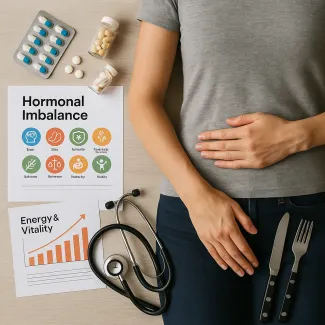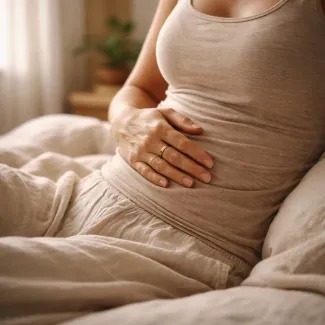
Understanding Hormonal Fluctuations in Your 30s and Beyond
How Your Body’s Inner Chemistry Shifts After 30 – and What You Can Do to Stay in Balance
What is Hormonal Imbalance and Why It Matters in Your 30s
Hormones are chemical messengers that regulate almost every function in the human body—from metabolism, reproduction, and mood, to skin health, energy, and sleep. After the age of 30, both men and women start to experience natural shifts in hormone levels. These changes may be subtle at first but can significantly impact physical, emotional, and mental well-being over time.
In your 30s, your body is transitioning from the reproductive peak years toward gradual decline in hormone production. For women, this may include estrogen and progesterone fluctuations, while men may notice a slow drop in testosterone. Additionally, hormones like cortisol, insulin, and thyroid hormones can also become imbalanced due to lifestyle, stress, or underlying health issues.
Identifying early signs of imbalance and taking preventive or corrective action can help maintain vitality, support healthy aging, and prevent chronic conditions later in life.
Recognizing the Common Signs of Hormonal Imbalance
Fatigue That Doesn’t Improve With Rest
Feeling tired despite getting a full night’s sleep is one of the earliest signs of hormonal dysregulation. Low thyroid function (hypothyroidism), adrenal fatigue, or low testosterone or estrogen can cause persistent exhaustion, especially in the morning or mid-afternoon.
Unexplained Weight Gain or Difficulty Losing Weight
Hormones like insulin, leptin, ghrelin, and cortisol play key roles in appetite regulation and fat storage. When they are not in balance, it becomes harder to lose fat or maintain a healthy weight—even with a clean diet and regular exercise.
Mood Swings, Anxiety, or Irritability
Hormonal imbalances in estrogen, progesterone, or testosterone can influence neurotransmitters like serotonin and dopamine, contributing to emotional instability. Anxiety and depression in your 30s are often linked to subtle hormonal shifts, particularly during PMS or chronic stress.
Brain Fog and Difficulty Concentrating
Low levels of thyroid hormones, cortisol dysregulation, and sex hormone deficiencies can impact mental clarity, memory, and focus. Many people describe this as feeling “foggy,” forgetful, or unable to stay mentally sharp throughout the day.
Irregular Periods or Heavy Menstruation
For women, erratic cycles, heavy bleeding, clotting, or missing periods may indicate estrogen dominance, low progesterone, thyroid dysfunction, or the early stages of perimenopause, which can begin as early as the mid-30s.
Low Libido and Sexual Dysfunction
Hormones drive sexual health. A decline in testosterone, estrogen, or DHEA can reduce libido, cause vaginal dryness, or result in erectile issues in men. A sudden or gradual drop in interest in intimacy often reflects hormonal causes.
Hair Thinning or Hair Loss
Hormonal imbalances—particularly those involving thyroid hormones, androgens (testosterone and DHT), or estrogen-progesterone ratios—can cause increased hair shedding, hair thinning, or noticeable changes in scalp coverage.
Acne, Oily Skin, or Skin Dryness
Skin is an excellent indicator of hormonal health. Adult acne, often seen around the jawline or chin, may be linked to androgen excess, while dry skin and eczema may point to thyroid or estrogen imbalances.
Insomnia or Difficulty Staying Asleep
Melatonin, cortisol, progesterone, and estrogen all influence sleep patterns. Imbalances can disrupt the circadian rhythm, making it hard to fall asleep, stay asleep, or wake feeling refreshed.
Digestive Issues and Bloating
Your gut and hormones are closely connected. An imbalance in estrogen, cortisol, or thyroid function can slow down digestion, increase bloating, or cause food sensitivities. This is especially relevant after 30 when digestive efficiency may decline.
What Causes Hormonal Imbalance After 30?
Chronic Stress and Cortisol Dysregulation
One of the biggest culprits in hormonal imbalance is chronic stress. Long-term activation of the HPA axis (hypothalamic-pituitary-adrenal system) results in elevated or depleted cortisol levels, which disrupt the balance of estrogen, testosterone, insulin, and thyroid hormones.
Poor Sleep Hygiene
Lack of quality sleep affects hormone production and recovery. Melatonin, growth hormone, cortisol, and testosterone all follow circadian patterns. Irregular bedtimes, screen exposure before sleep, and insufficient deep sleep interfere with these cycles.
Nutrient Deficiencies
Micronutrients like magnesium, zinc, selenium, iodine, vitamin D, and B vitamins are essential for hormone production and receptor sensitivity. Deficiency in any of these can lead to dysfunction across multiple systems.
Blood Sugar Instability and Insulin Resistance
High sugar intake and frequent snacking can lead to insulin resistance, which disrupts hormonal signals related to hunger, metabolism, and fat storage. It also affects testosterone and estrogen balance, especially in women with PCOS.
Excess Alcohol or Caffeine
Both alcohol and caffeine disrupt liver detox pathways, hormone metabolism, and sleep cycles, creating a ripple effect that interferes with estrogen clearance, adrenal health, and neurotransmitter balance.
Environmental Toxins and Endocrine Disruptors
Xenoestrogens found in plastics, cosmetics, and household cleaners mimic natural estrogen and interfere with hormone receptors. These compounds accumulate in fat tissue and disrupt hormonal harmony.
Sedentary Lifestyle
Lack of movement reduces insulin sensitivity, increases cortisol, and lowers testosterone and growth hormone. Moderate strength training and aerobic activity can help rebalance key hormones and boost metabolism.
Natural Ways to Support Hormonal Balance After 30
Adopt a Hormone-Friendly Diet
Focus on whole, unprocessed foods rich in fiber, healthy fats, quality protein, and antioxidants. Prioritize:
- Cruciferous vegetables (broccoli, cauliflower, kale) for estrogen detoxification
- Omega-3 fats (from flaxseeds, chia, fish) to reduce inflammation
- High-fiber foods to balance blood sugar and improve gut microbiome
Avoid ultra-processed foods, added sugars, and artificial sweeteners that disturb hormonal signaling.
Get Enough Quality Sleep
Aim for 7–9 hours of sleep in a dark, quiet, and cool environment. Support melatonin production by avoiding screens before bedtime and establishing a consistent wind-down routine.
Incorporate Strength and Mobility Training
Resistance training is especially effective at increasing testosterone, growth hormone, and insulin sensitivity. Combine with yoga or mobility practices to reduce stress and support adrenal health.
Manage Stress Daily
Practice mindful breathing, meditation, journaling, or gentle stretching to reduce cortisol spikes. Chronic stress not only depletes hormones but also affects digestion, immunity, and cognition.
Support Liver Detoxification
Your liver helps eliminate excess estrogen and metabolic waste. Help it function by drinking enough water, eating bitter greens (arugula, dandelion), and limiting alcohol and toxins.
Focus on Gut Health
Your gut microbiome influences estrogen recycling, inflammation, and immune function. Include fermented foods (sauerkraut, kimchi), prebiotic fiber (onions, garlic, leeks), and avoid antibiotics unless necessary.
Balance Blood Sugar
Eat balanced meals with protein, fat, and fiber. Avoid skipping meals or loading up on simple carbs, which cause insulin spikes and hormonal crashes.
Supplements to Consider (Consult with a Healthcare Professional)
Magnesium
Supports adrenal glands, reduces PMS symptoms, and improves sleep quality.
Adaptogens (Ashwagandha, Rhodiola, Holy Basil)
Herbs that help regulate the stress response and cortisol levels.
Vitamin D3
Important for immune health, mood stability, and hormone receptor function.
Omega-3 Fatty Acids
Reduce inflammation and support estrogen and progesterone balance.
Probiotics
Aid in maintaining a healthy gut and support estrogen metabolism.
When to Seek Medical Testing and Evaluation
If you experience persistent or worsening symptoms, it may be time to test your hormone levels. Tests to consider:
- Thyroid Panel (TSH, Free T3, Free T4, Reverse T3, antibodies)
- Sex Hormones (Estrogen, Progesterone, Testosterone, SHBG, DHEA)
- Cortisol (morning and throughout the day – via saliva or blood)
- Insulin and Glucose levels
- Vitamin and mineral status (B12, D, magnesium, zinc)
A functional or integrative health practitioner can interpret results in context and create a personalized plan for restoration.
Habits That Help Rebalance Hormones Naturally
Drink Filtered Water and Reduce Plastics
Avoid BPA and phthalates found in plastic bottles and food containers. Use glass or stainless-steel alternatives.
Use Clean Beauty and Personal Care Products
Choose products free from parabens, synthetic fragrances, and phthalates which can act as endocrine disruptors.
Track Your Cycle or Symptoms
Monitoring menstrual cycles, energy levels, and mood can help identify patterns and pinpoint triggers.
Get Sunlight in the Morning
Natural light exposure helps regulate circadian rhythm and boosts testosterone and serotonin production.
Avoid Blue Light After Sunset
Blue light from screens disrupts melatonin and sleep hormones. Use blue light filters or glasses after sunset.
Cultivate Social Connection and Joy
Positive relationships and joyful experiences raise oxytocin, which counteracts cortisol and improves hormonal balance.
Hormonal Imbalance and the Impact on Long-Term Health
Ignoring hormone symptoms can lead to metabolic syndrome, infertility, osteoporosis, cardiovascular issues, or cognitive decline later in life. Addressing them early, especially in your 30s, provides the foundation for healthy aging and long-term vitality.
Key Lifestyle Shifts That Make a Difference
- Prioritize quality sleep and recovery
- Move your body daily—muscle is metabolically active and hormone-supportive
- Choose real food over quick fixes
- Learn to say no to chronic stress and overcommitment
- Surround yourself with people and environments that support well-being
By becoming more aware of your body’s signals and addressing hormonal shifts proactively, you can navigate your 30s with more energy, resilience, and clarity.





